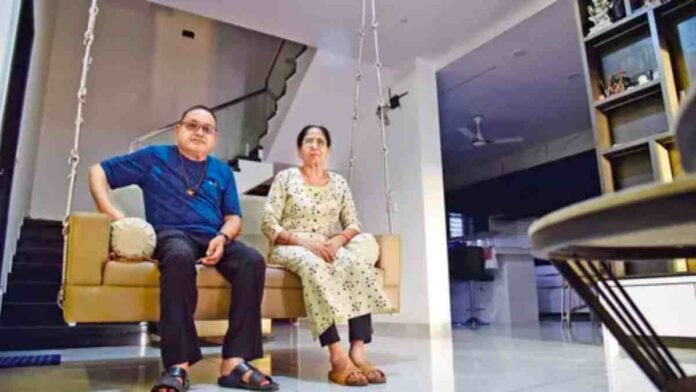Residents of some villages in Surat district, Gujarat, have received the largest land compensations for the Mumbai-Ahmedabad High-Speed Rail (MAHSR) project. Surat received the most compensation in Gujarat.
Residents of Antroli, Niyol, and Mohni villages in Surat district have received some of the largest land compensations for the Mumbai-Ahmedabad bullet train project.
Kantilal and Hasuben Patel earned Rs 55 lakh for selling their Mohni home to the bullet train route. The local priest, Indravadan Vyas, and his son Parimal, who has carried on his father’s sacred knowledge, sat on the sofa. Satishchandra Desai of Antroli is proud to host the Bullet Train project’s Surat stop.
The Central government took the plot of land from the Vyas family to develop the Indian railway’s ambitious Mumbai-Ahmedabad High-Speed Rail (MAHSR) project. The project, which began in 2018 as a cooperation between the Indian government and Japan’s Shinkansen Technology, would be finished by 2026 and cost Rs 19,600 crore.
The corridor would connect India’s business hubs of Mumbai, Thane, Vapi, Surat, Vadodara, and Ahmedabad. Surat received the most compensation in Gujarat, with Surat receiving the most, followed closely by Ahmedabad at Rs 1,200 crore. The Antroli gram panchayat, comprising deputy sarpanch Vismay Solanki, observes that three private banks have opened branches due to the unexpected infusion of money. Vyas, who donated six bighas (17,427 sq ft) of land for the project, says it is the good deeds of their ancestors that prompted them to buy this land.
The Gaushala Trust, a Gaikwad relic, gave peasants like Vyas land in 2002 on the condition that they would not sell it. The locals received four times the jantri’s worth after many rounds of negotiations with NHSRCL officials. To compensate for the lengthy talks, the Tax Deducted at Source (TDS) was repaid and 12 percent interest was imposed. The Antroli Lad family enjoys their wealth but spends it cautiously. Despite receiving Rs 8 crore, family head Hiren Lad kept his work.
Desai Desai is an NRI who owns Florida hotels and coffee shops and travels between India and the US. He has kept his ancestral land for its economic importance and has put most of the money in Fixed Deposits to pay his grandchildren’s education. The Surat bullet train station’s construction on his land makes him proud. Bhavesh Barad, who had to give up land in Niyol, owns the station’s other acreage and was the biggest project recipient with Rs 96 crore in compensation. To plan the project, Antroli Sarpanch Umesh Rathod, deputy Sarpanch Vismay Solanki, and the gram panchayat study a village map.
Outsiders are interested in the unexpected money. Three big private banks have opened offices in Antroli in the last three years, offering VIP services to crorepati customers. Residents are suspicious about outsiders’ unexpected attention. They think certain groups may try to persuade newly minted millionaires into “investing” in “attractive schemes”. The locals of Valsad, Gujarat and Palghar, Maharashtra have accepted the sudden shift in their life due to the fatalism of their culture.
They have used the money to buy new plots of land and have saved the funds for future generations. However, the locals struggled to accept the events as the discussions began, with some informing the press that they had been cheated. Residents of Valsad, Gujarat and Palghar, Maharashtra were furious at the NHSRCL for offering substantially below-market compensation.
After the NHSRCL made its stand clear, it was not practical to hold on to the land for emotional reasons. Hiren Lad, who received 18 crore for two bighas, took a trip to Thailand and Singapore with his family, renovated the house, and is now sending his son to a better school.
He chose to retain his job since he has always been a working man and would like to keep being one. Mahadev Desai, a 64-year-old Niyol farmer, earned Rs 35 crore for seven bighas. He is thankful but unenthusiastic about the recompense. He has built his house, bought vehicles, and taken care of his farms on his own since he was 19. His sons have well-paying jobs, but if he lets it get to his head, he will stray off the path.
Visits to numerous more houses reveal the explanation for this careless attitude. The village and Niyol’s Gajjar family live indifferently. They have started using organic raw material in their farms, installed new and better fencing, and employed labourers to lighten some of their load. However, sitting back and enjoying the sudden riches will make them lazy and complacent. Gajjar, a family spokesman, declares himself as the family spokesman two minutes into the interview.
Niyol’s jantri is substantially lower than Antroli’s, which lowers compensation. Mohni villagers struggle with excitement and confusion, as residential land was bought and some residences along the rails were demolished. Kantilal and Hasuben Patel also lost their home, but they used their Rs 55 lakh to create a new one with sparkling tiles, huge balconies, and two swings on the front porch. The NHSRCL bought much of the temple’s large property to install Bullet Train tracks, reducing it. A lone tree separates the past from the future from the tiny mandir.



